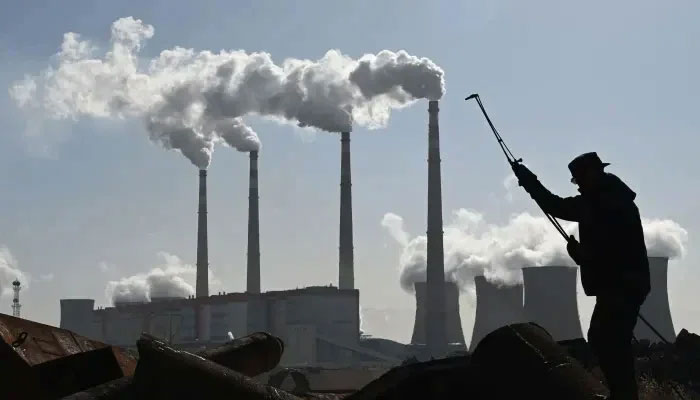Failure to retrofit IPPs causes loss of UN carbon credits: report
Failure is primarily due to a lack of understanding between dirty thermal electricity generation and climate change
ISLAMABAD: Pakistan has failed to harness the UN carbon credit facilities from the United Nations Framework Convention on Climate Change (UNFCCC) because the government did not push Independent Power Producers (IPPs) to retrofit their plants to reduce carbon emissions.
This failure is primarily due to a lack of understanding within the ministries, government departments, and regulatory bodies regarding the connection between dirty thermal electricity generation and climate change.
This observation was made by eminent energy expert Engineer Arshad H. Abbasi in his latest report titled “Climate Change and Dirty Electricity Generation in Pakistan: Existential Crisis.” Had government authorities compelled the owners of inefficient IPPs to update their plants to reduce carbon emissions, it could have resulted in lower tariffs and economic benefits for power producers. However, this did not happen.
Drastic reduction in hydroelectricity production and increased reliance on thermal and coal-fired power plants has resulted in higher electricity costs and the rapid depletion of natural gas reserves.
Abbasi report stated that the country’s power sector woes have created an existential crisis, contributing to premature deindustrialisation and severe energy poverty. The staggering circular debt is another major issue, acting as a noose around the government’s neck.
His report emphasises that the Pakistani government has negligently never promoted the retrofitting of thermal plants to utilise UNFCCC’s carbon credit facilities, which could increase efficiency and reduce fuel consumption per unit of older and inefficient power plants. As an example of this negligence, the report mentions the government’s lackluster support for retrofitting applications by two IPPs to the UNFCCC in March 2013.
It is inexcusable that the government did not make retrofitting mandatory for IPPs’ thermal plants. By failing to reduce GHG emissions, the government is contributing to the social and economic damages caused by climate change, which will be borne by the people of Pakistan.
Industry-wide adoption of retrofitting could have reduced electricity tariffs and greenhouse gas emissions. Sadly, the country also missed the opportunity to obtain USD-based carbon credits, a significant loss given the severe scarcity of foreign reserves.
Abbasi’s report highlights that Pakistan’s struggling power sector has turned the country into a global beggar.
The worst impact of gas and oil-fired thermal plants coupled with a new fleet of coal-fired power plants has been the unprecedented increase in greenhouse gas (GHG) emissions.
Pakistan’s carbon emissions from electricity generation increased from minimal levels in 1990 to 52 million tons of CO2, 4.4 million tons of CH4, and 0.04 million tons of N2O in 2023 due to fossil fuel-based electricity generation alone.
The Pakistani government has never promoted retrofitting of thermal plants to use UNFCCC facilities to increase efficiency and reduce fuel consumption per unit of electricity produced, thereby lowering the cost of electricity for 250 million Pakistanis and resulting in low greenhouse gas emissions. Losing the opportunity to obtain carbon credits in dollars is particularly damaging given the country’s foreign reserve crisis.
Pakistan has signed numerous international conventions, including the Paris Agreement, pledging to cut greenhouse gas (GHG) emissions by 50% by 2030. However, the government has been discouraging rooftop solar systems, a flagrant violation of the UN Convention on Climate Change, instead of focusing on this goal.
-
 Camila Mendes Reveals How She Prepared For Her Role In 'Idiotka'
Camila Mendes Reveals How She Prepared For Her Role In 'Idiotka' -
 China Confirms Visa-free Travel For UK, Canada Nationals
China Confirms Visa-free Travel For UK, Canada Nationals -
 Inside Sarah Ferguson, Andrew Windsor's Emotional Collapse After Epstein Fallout
Inside Sarah Ferguson, Andrew Windsor's Emotional Collapse After Epstein Fallout -
 Bad Bunny's Star Power Explodes Tourism Searches For His Hometown
Bad Bunny's Star Power Explodes Tourism Searches For His Hometown -
 Jennifer Aniston Gives Peek Into Love Life With Cryptic Snap Of Jim Curtis
Jennifer Aniston Gives Peek Into Love Life With Cryptic Snap Of Jim Curtis -
 Prince Harry Turns Diana Into Content: ‘It Would Have Appalled Her To Be Repackaged For Profit’
Prince Harry Turns Diana Into Content: ‘It Would Have Appalled Her To Be Repackaged For Profit’ -
 Prince William's Love For His Three Children Revealed During Family Crisis
Prince William's Love For His Three Children Revealed During Family Crisis -
 Murder Suspect Kills Himself After Woman Found Dead In Missouri
Murder Suspect Kills Himself After Woman Found Dead In Missouri -
 Sarah Ferguson's Plea To Jeffrey Epstein Exposed In New Files
Sarah Ferguson's Plea To Jeffrey Epstein Exposed In New Files -
 Prince William Prepares For War Against Prince Harry: Nothing Is Off The Table Not Legal Ways Or His Influence
Prince William Prepares For War Against Prince Harry: Nothing Is Off The Table Not Legal Ways Or His Influence -
 'How To Get Away With Murder' Star Karla Souza Is Still Friends With THIS Costar
'How To Get Away With Murder' Star Karla Souza Is Still Friends With THIS Costar -
 Pal Reveals Prince William’s ‘disorienting’ Turmoil Over Kate’s Cancer: ‘You Saw In His Eyes & The Way He Held Himself’
Pal Reveals Prince William’s ‘disorienting’ Turmoil Over Kate’s Cancer: ‘You Saw In His Eyes & The Way He Held Himself’ -
 Poll Reveals Majority Of Americans' Views On Bad Bunny
Poll Reveals Majority Of Americans' Views On Bad Bunny -
 Wiz Khalifa Thanks Aimee Aguilar For 'supporting Though Worst' After Dad's Death
Wiz Khalifa Thanks Aimee Aguilar For 'supporting Though Worst' After Dad's Death -
 Man Convicted After DNA Links Him To 20-year-old Rape Case
Man Convicted After DNA Links Him To 20-year-old Rape Case -
 Royal Expert Shares Update In Kate Middleton's Relationship With Princess Eugenie, Beatrice
Royal Expert Shares Update In Kate Middleton's Relationship With Princess Eugenie, Beatrice




